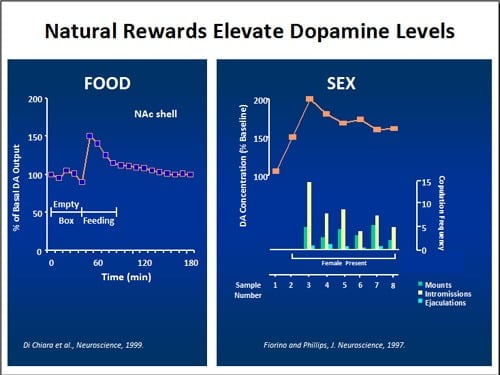Is Internet porn like watching golf or like alcohol addiction ? It seems like a silly FAQ, but a famous sexologist stated that Internet porn is no different than playing golf or over-reading the Talmud. Other bogus examples include “watching sunsets” and “taking walks.”
Outliers exist for many biological indices. With that in mind, it’s hypothetically possible that one could manifest addiction-related brain changes by “over-working” or “over-reading” the Talmud, or playing golf, but researchers have found that brains react very similarly to sexual and addiction cues, and quite differently to, for example, outdoor nature scenes. See Cue-induced cocaine craving: neuroanatomical specificity for drug users and drug stimuli (2000) – Brain activation to cocaine cues similar to activation to porn
Supernormal rewards
Food, sexual stimulation, and novelty universally raise dopamine in all mammals (sex being the highest). Now that we have supernormal versions of these natural rewards – high fat/high sugar foods, Internet porn – we are seeing addictions rise for both.
As explained in Porn, Pseudoscience and DeltaFosB, DeltaFosB must accumulate over time to cause the first addiction-related brain change: sensitization. This drives chronic over consumption and sometimes overrides natural satiation mechanisms. I have trouble imagining this mechanism activated through reading the Talmud. Reading the Talmud, playing golf, or working are not universally rewarding to all humans in the way sexual arousal is. Nor is there an innate satiation mechanism for any of these.
Pathological gambling or video games?
You might argue that neither pathological gambling nor video games activates an innate satiation mechanism. This is where extreme novelty and violations of expectations come into play, as both strongly activate the dopamine system. Hours of gambling or video games continuously activate phasic (spiking) dopamine. Continuously high levels of dopamine stimulate the production of DeltaFosB. As DeltaFosB accumulates, it sensitizes the brain to the stimulus that triggered its accumulation.
Again, it’s hard to imagine this occurring from reading the same book over and over again. It’s not novel, and doesn’t violate expectations. “Liking” to do something does not equal “addiction to doing it.”
Internet porn
Internet porn combines our highest endogenous levels of dopamine (sexual stimulation) with extreme novelty, violation of expectations, searching & seeking, and shock & surprise – all of which strongly activate the dopamine system. And one can watch for hours on end. Add this to the facts that (1) adolescents produce higher levels of DeltaFosB in response to dopamine and (2) we now have a whole lot of young guys complaining about porn addiction and porn-induced sexual issues. See Studies linking porn use or porn/sex addiction to sexual dysfunctions, lower brain activation to sexual stimuli, and lower sexual satisfaction and Porn Then and Now: Welcome to Brain Training.
Many relevant links are in Porn, Pseudoscience and DeltaFosB. However you can also find research collected in these 3 links:
Eric Nestler is one of the foremost addiction neuroscientists. An FAQ from his lab page: http://neuroscience.mssm.edu/nestler/faq.html
07. Do these changes occur naturally in your brain without the influence of a drug of abuse?
It is likely that similar brain changes occur in other pathological conditions which involve the excessive consumption of natural rewards, conditions such as pathological over-eating, pathological gambling, sex addictions, and so on.
No mention of the Talmud or golf or sunsets or ….
